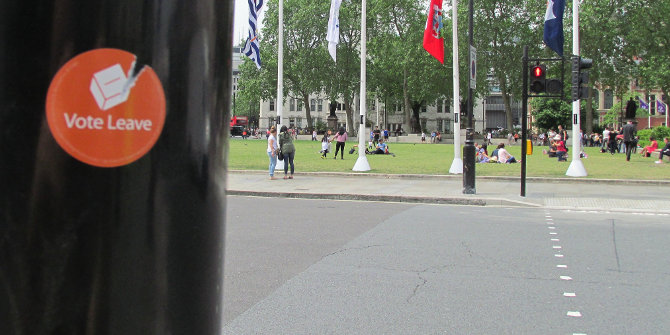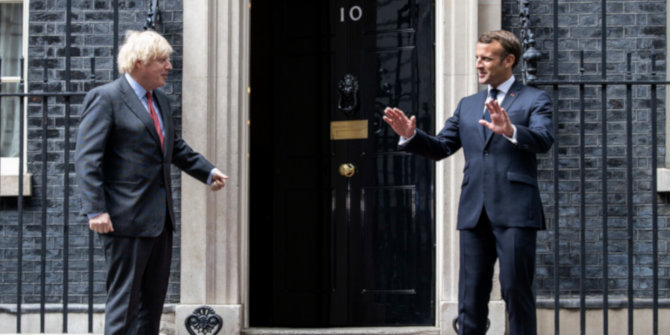
 The UK is generally recognised as a major player in international diplomacy, and is one of the five permanent members of the UN Security Council. But how might Brexit impact on its status at the UN, and will the country be a stronger or weaker force on the international stage after leaving the EU? Megan Dee and Karen E. Smith outline the challenges and opportunities that exist for the UK as it seeks to reshape its role in international affairs after Brexit.
The UK is generally recognised as a major player in international diplomacy, and is one of the five permanent members of the UN Security Council. But how might Brexit impact on its status at the UN, and will the country be a stronger or weaker force on the international stage after leaving the EU? Megan Dee and Karen E. Smith outline the challenges and opportunities that exist for the UK as it seeks to reshape its role in international affairs after Brexit.

View during the 25th Session of the UN Human Rights Council, Credit: UN Geneva (CC-BY-SA-3.0)
As divorce proceedings commence, attentions around the world turn to the specifics of what the UK’s exit from the EU will look like, and, crucially, cost. Whilst these negotiations will occupy much column space for the next two years and beyond, a fundamental question remains of what the cost of Brexit will be for the UK’s international influence. How does Brexit impact the UK’s wider international role and its relationships with Europe and the world at large? Such a question is even more pertinent when looked at from the perspective of the United Nations (UN), where the UK has considerably benefitted from its membership of the EU, and where the UK’s post-Brexit performance will be most starkly judged, and legitimised, by its partners and the world at large.
It is worth noting that the UK is widely considered to be one of the UN’s more influential members, its position being characterised, above all, by its permanent membership of the UN Security Council. The UK is the sixth largest contributor to the UN’s general budget (contributing 4.5%) and peacekeeping budget (contributing 5.8%). Since 2013, the UK has also been one of the few developed countries that meets the UN target of giving 0.7% of its gross national income in official development aid.
UK influence has, however, also been boosted by its membership of the EU, which is the most well-organised and well-resourced group at the UN. There is virtually nothing at the UN on which the EU does not have a position. Through intense coordination, EU member states try to reach agreement on joint statements, the sponsorship of resolutions, and united voting positions. They are not always successful, but EU unity at the UN is striking, and contrasts favourably with the unity of many other political groups.
The UK’s status as an EU member also matters because group politics is, and will continue to be, fundamental to UN politics. Whether it is over human rights, or on nuclear weapons, the UK cannot go it alone. In both examples and across the UN more broadly, groups are becoming a driving force of multilateralism. The UK will therefore be severely limited if it seeks to pursue its interests within the UN without recourse either to the EU or other groups.
Diplomats in the UN often speak and sponsor resolutions on behalf of groups, and spend a good deal of time exchanging information, coordinating positions, and agreeing on initiatives within the context of groups. Groups at the UN comprise not only the five formal regional blocs, but also a burgeoning number of political groups. These include regional or other intergovernmental organisations such as ASEAN, the Non-Aligned Movement, the Nordic Group and so on. They also include more informal political groups formed either as permanent caucusing groups to the UN i.e. JUSCANZ (Japan, the US, Canada, Australia and New Zealand, as well as Norway and Iceland), or as single-issue lobbying groups, such as the Small Island Developing States.
Working within the EU at the UN has therefore been of significant benefit to the UK. Within the Human Rights Council, for example, the EU is considered a major power. It is an active participant in debates, with the presidency usually presenting around 40-50 statements on behalf of EU member states each session. It also frequently sponsors resolutions and has been the principal forum through which British diplomacy has worked on human rights. Another example is that of the UN’s nuclear disarmament forums. On nuclear politics the EU has, at times, acted as a crucial hub for information sharing between its members, has provided the UK with important political cover for its nuclear-weapon status, and has also been a constant champion of the global nuclear non-proliferation regime to which the UK is a major supporter.
Of course EU coordination is frustrating, being both time-consuming and slow, and often results in lowest common denominator outcomes. In UN nuclear politics, the EU is frequently criticised for its rhetoric and ambiguity because its common position is the bare minimum of what its – highly diverse when it comes to nuclear issues – member states can agree to. Consequently, many EU member states, including the UK, have looked to other political groups to ensure their interests, which not only weakens EU unity but stretches the capacity of the member states involved. By removing itself from the EU, the UK would therefore be removing itself from the requirement, set out in the Treaty of European Union, to coordinate with the other EU-27 on multilateral matters.
Brexit could, in turn, allow the EU to refocus its diplomatic activities onto other cross-regional activities. The UK has itself been at the forefront of efforts to enhance coordination between the ‘P-5’ (permanent members of the UN Security Council) on matters relating to the Nuclear Non-Proliferation Treaty.
The UK nevertheless has limited options when it comes to allying itself with alternative groups. The Commonwealth – highlighted during the referendum as a potential avenue for UK influence – has never intervened in the Human Rights Council or any of the UN’s nuclear forums, and, across the UN more generally, Commonwealth members are far more active within groups such as the African Group or Non-Aligned Movement. The WEOG and JUSCANZ meanwhile are mainly information sharing groups, and whilst JUSCANZ may coordinate on some human rights issues, the UK would likely face resistance from other members if it sought to turn it into more of a caucus. More than this though, the aim of cross-regional diplomatic activity is typically to work with one (or more) states in the hope that they can ‘bring along’ others from their region. States on the margins of groups – not least a group as important as the EU – are thus deemed less attractive.
What will therefore matter for UK diplomacy and influence at the UN post-Brexit, will be the UK’s relationship and diplomacy vis-à-vis the EU. At the Human Rights Council the UK cannot hope to exert leverage without recourse in some way to the EU who, in the large part, it agrees with anyway. Even in the UN’s nuclear forums, where the EU is oftentimes weak and divided, the EU remains a group that other actors tend to listen to and who the UK finds considerable common ground on matters relating to non-proliferation. An immediate dilemma therefore faces a post-Brexit UK at the UN. Will the UK allow itself to work with, or even follow, the EU where matters of like-mindedness arise, or will it seek to take the lead separate and apart?
What is clear is that, in walking away from the EU, the UK must now undertake a substantive review, and indeed rewiring, of its international relations and diplomatic channels. Such rewiring will be time-consuming and extensive and, in certain policy fields, being a follower of the EU may present the UK its only, and certainly easiest, choice. For example, the UK could formally align with EU statements – joining the company of other non-EU European states such as Liechtenstein, Norway and Moldova – though this would require an EU-UK agreement to that effect. In the longer-term however, the UK may need to seek ways of partnering more formally with the EU on matters of common foreign and security interests at the UN and, in so doing, utilise elements of a previously successful relationship to mutual advantage.
Please read our comments policy before commenting.
Note: The above draws on the authors article in the BREXIT special issue of the The British Journal of Politics and International Relations (open access; DOI: 10.1177/1369148117710208). This article originally appeared at our sister site, British Politics and Policy at LSE, and gives the views of the authors, not the position of EUROPP – European Politics and Policy or the London School of Economics.
 Megan Dee – University of Warwick
Megan Dee – University of Warwick
Megan Dee is Associate Research Fellow in the Department of Politics and International Studies at the University of Warwick.
–
 Karen E. Smith – LSE
Karen E. Smith – LSE
Karen E. Smith is Professor of International Relations and Director of the European Foreign Policy Unit at the LSE.





The UK is a permanent member, so why should there be any change in its influence?. As for allying itself with the EU after we leave, why should we even contemplate that?
The article you are writing about answers both your questions very well. I’m unsure from your comment if you’ve read it or not…
The article is full of speculation and seeks to create an issue from nothing and then poses a potential solution.
It also seeks to portray the EU as a strong and credible international body, which, as we have seen from past events in Bosnia and current events in Italy and Greece, it is anything but. Yes I read it.
I’ll assume you’ve done the decent thing and read it now. You asked two questions that are directly addressed in the article and didn’t make a single counter-argument as to why the
authors’ views on these two points are incorrect.
In your second comment, you’ve at least expanded on this and said that you think there is speculation about a non-existent problem. However, it’s clear the purpose of the article is to look at how Brexit might affect the UK’s approach, not to portray Brexit as a problem. Even ardent Eurosceptics would accept this approach is likely to change and the article clearly identifies opportunities as well as problems in different areas.
I must say, one gets a little tired of seeing people instinctively trashing things without settling on a proper argument beforehand. This is a reasonable piece in my view that gives both sides of the argument. It’s exactly the kind of cost-benefit calculation the government should be doing themselves. For better or worse, Brexit will affect our international standing and we need to have a solid understanding of how that might play out if we’re to make the most of it.
I would align ourselves more with the Arab states & Israel